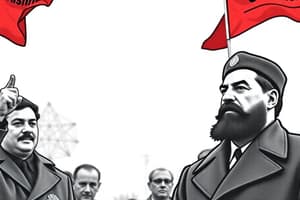Podcast
Questions and Answers
What is the primary goal of communism, according to Marxist theory?
What is the primary goal of communism, according to Marxist theory?
- To eliminate class conflict and achieve equal distribution of resources (correct)
- To promote social equality and collective ownership
- To promote individual freedom and anarchism
- To establish a democratic government and market economy
What is the term for the collective ownership of the means of production in a socialist economy?
What is the term for the collective ownership of the means of production in a socialist economy?
- Social ownership (correct)
- Proletariat
- Class consciousness
- Dialectical materialism
What is the term for the fundamental change in a society's power structure, often through violent means?
What is the term for the fundamental change in a society's power structure, often through violent means?
- Revolutionary situation
- Cultural revolution
- Revolutionary class
- Revolution (correct)
What is the term for the transitional phase between capitalism and communism in Marxist theory?
What is the term for the transitional phase between capitalism and communism in Marxist theory?
What is the key concept in Marxist theory that refers to the conflict between different social classes over economic resources and power?
What is the key concept in Marxist theory that refers to the conflict between different social classes over economic resources and power?
What is the term for the type of socialism that combines democratic principles with socialist economics?
What is the term for the type of socialism that combines democratic principles with socialist economics?
What were the key characteristics of Tsar Nicholas II's rule in Russia from 1894 to 1917?
What were the key characteristics of Tsar Nicholas II's rule in Russia from 1894 to 1917?
What event led to the creation of the Duma in Russia?
What event led to the creation of the Duma in Russia?
What was the main goal of the Bolsheviks, founded by Vladimir Lenin?
What was the main goal of the Bolsheviks, founded by Vladimir Lenin?
What was the outcome of the February Revolution in 1917?
What was the outcome of the February Revolution in 1917?
What was the result of the October Revolution in 1917?
What was the result of the October Revolution in 1917?
What was the main conflict of the Russian Civil War (1918-1922)?
What was the main conflict of the Russian Civil War (1918-1922)?
What was the significance of the execution of Tsar Nicholas II and his family in 1918?
What was the significance of the execution of Tsar Nicholas II and his family in 1918?
What was the role of the Cheka during the Russian Civil War?
What was the role of the Cheka during the Russian Civil War?
What was the outcome of the Russian Civil War?
What was the outcome of the Russian Civil War?
Who were the key figures in the Russian Revolution and subsequent government?
Who were the key figures in the Russian Revolution and subsequent government?
Flashcards are hidden until you start studying
Study Notes
Marxism
- Developed by Karl Marx and Friedrich Engels
- Critique of capitalism, arguing it creates class conflict and alienation
- Key concepts:
- Dialectical materialism: history is driven by class struggle and economic conditions
- Class consciousness: workers must recognize their common interests and unite against capitalists
- Proletariat: working class that will overthrow the bourgeoisie (capitalist class)
- Dictatorship of the proletariat: transitional phase between capitalism and communism
- Communism: classless, stateless society with no private property
Socialism
- General term for economic systems that aim to promote social equality and collective ownership
- Types of socialism:
- Democratic socialism: combines democratic principles with socialist economics
- Market socialism: combines elements of socialism and capitalism
- Utopian socialism: emphasizes the creation of a perfect society
- Anarchist socialism: rejects the state and emphasizes individual freedom
- Key concepts:
- Social ownership: collective ownership of the means of production
- Redistribution of wealth: reducing economic inequality through taxation and social welfare
Revolution
- Fundamental change in a society's power structure, often through violent means
- Types of revolution:
- Political revolution: change in government or political system
- Social revolution: change in social and economic structures
- Cultural revolution: change in cultural values and norms
- Key concepts:
- Revolutionary situation: conditions that make revolution possible (e.g., economic crisis, political instability)
- Revolutionary class: group that leads the revolution (e.g., proletariat, peasantry)
Economic Systems
- Communism:
- No private property or markets
- State or collective ownership of the means of production
- Central planning and distribution of resources
- Goal: equal distribution of resources and elimination of class conflict
- Socialist economies:
- Mixed ownership: public and private ownership of the means of production
- Regulation of markets and industries
- Social welfare programs and progressive taxation
- Goal: reduce economic inequality and promote social welfare
- Key concepts:
- Means of production: factories, land, and other resources used to create goods and services
- Class struggle: conflict between different social classes over economic resources and power
Studying That Suits You
Use AI to generate personalized quizzes and flashcards to suit your learning preferences.




